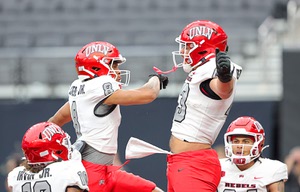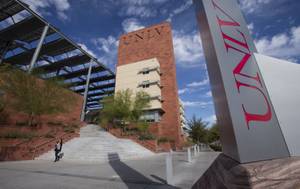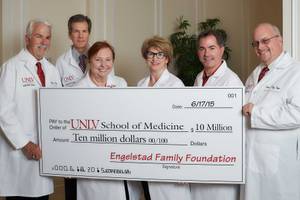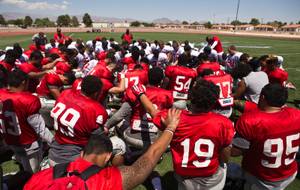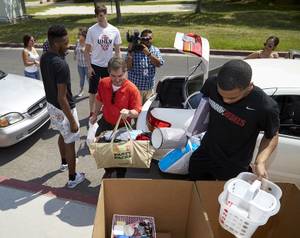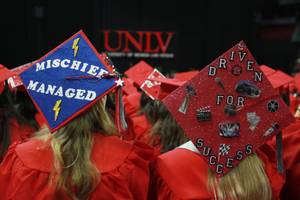You never know when you’re going to get a Slip ’N Slide question, even when you’re the president of a university. UNLV’s Len Jessup took it in stride, answering diverse queries cultivated from UNLV brass and alumni, a TV star and a city leader, Weekly staffers and our creative friends on social media.
It wasn’t a typical practice session for Jessup’s first State of the University address coming up on September 17, but he painted a bold picture of UNLV’s next chapter.
Guy Fieri, celebrity chef: Welcome to Vegas!! As a proud UNLV alumnus who, just this past week, moved my son onto campus for his freshman year, what attracted you to the school?
The first thing is, I’d say to Guy that I love his show and we watch it a lot. (laughs) ... We were moving students into the dorms and I guess he was with his son in the Student Union, and I literally missed him by three minutes. I was looking forward to meeting him in person!
And then, the thing that attracted me was just great opportunity. I’ve often said over the last several months here, it’s just personally such a great opportunity to be at this university while it’s striving to be a top-tier university—in this place, at this time, with everything that’s happening in Southern Nevada right now in terms of growth and economically. … And it was a good fit for me with the things I had done before at the universities that I’d been at. So I saw a great opportunity and a great fit to come and make a difference.
Erin Ryan, Las Vegas Weekly managing editor: You have a reputation for being really sharp fiscally, and I think people are excited about what you might be able to do at UNLV. But that excitement comes with major expectations. Are you feeling the pressure?
There’s a great presidential quote that I’m very fond of, that we do these things because they’re difficult. It’s the challenge that makes it interesting and compelling and something that you want to be involved in. And I feel that way about health care and the medical school in particular, and about everything else that we’re doing with UNLV. That’s why I wanted to be here, to be a part of this.
What I would say, too, just in terms of my background and the great opportunities I’ve had, I felt like it wasn’t so much about being sharp fiscally, like in terms of sharpening your pencil and figuring out how to pay for things. It was more looking at things with an abundance mentality. … I always think there are creative ways to come at things. And here, I mean, we’ve already seen it in the last seven months. The legislative session ended on June 1, and it was one of a handful of the best [funding] years ever for UNLV—huge! And then on July 1, we ended the fiscal year, the fundraising year, and that was one of the two or three best fundraising years ever for UNLV. And now, record enrollments as we begin the semester. So I’m looking at it like, people are stepping up to commit to UNLV, either legislatively or philanthropically or coming here to go to school. That’s a very good sign about the UNLV brand.
Julie Ann Formoso, Las Vegas Sun reporter and UNLV grad: How do you plan to improve student services, as that promise was made years ago when tuition was raised?
Early on in the prior school year, when [acting President] Don Snyder started the strategic planning process, initially it was framed around being a Tier One Carnegie university, and through that whole process we learned that we needed to do a lot more than just rank higher on the Carnegie classifications, because that really only speaks to one part of the university, and it’s mainly faculty in the sciences and engineering that go after grant funding. We needed to get better at a lot of things, not just that. So that’s when that whole process expanded, and then we shifted how we describe it. We don’t want to be a Tier One Carnegie school anymore—we want to be a top-tier university in everything that we do. And we identified five pathway goals that we’re now working on implementing. One is around research and creative and scholarly activity; one is around the medical school; one is around better community partnerships; one is around fixing infrastructure and business processes and how we get stuff done here on campus; and one is around student success and student achievement. … I think that things have gotten better on this campus, my sense of things over the last two, three years, but I think there’s a recognition that we need to continue to get better at the student experience and what outcomes students achieve as a result of coming here. I think everybody recognizes that’s got to be better as we go forward. So we formed the five pathways goals; we have committees around each of them that are working this school year on implementing more ideas and good best practices from around the country, so I think you’ll see more to come in improvements in student services.
One of the bright spots I would point to is our Academic Success Center run by Ann McDonough. It’s a great example of what’s possible here. So that’s an operation that’s relatively new on campus that’s there to provide students with advice and coaching and mentors or advising on classes, whatever is needed, kind of one-stop shopping. And when students go through that center and seek help, the retention rates on those students are now a little bit in excess of 90 percent. That’s an example of new things that are happening that I think are helping a lot, and we just recognize we’ve got to do a lot more of that.
@elsieday01: When will we get the medical school?
The first cohort of 60 students will begin in the fall of 2017. … The community really stepped up to match what the legislature did with the funding that we needed. … There’ll be 60 full scholarships for that first cohort for their four years.
Many, many community members stepped up to do that. And Kris Engelstad McGarry and the Engelstad Foundation, who already do a bunch of other scholarships here on campus, played a critical role in that. They did 25 out of the 60 just to get that launched, and then we finished it off with 60 by the end of the legislative session. And then the Engelstad Foundation committed just over the summer to do 25 more scholarships for the second cohort, 25 more for the third cohort, and 25 more for the fourth cohort. So they’re going to do 100 four-year scholarships. So that is truly amazing, the community stepping up like that. It makes it easier for us to attract good students to be in the program.
@ConqueringSquid: Any chance of getting bike lockers this year?
There is. We have a lot more bike riders on our campus, that’s for sure, and we’ve added hundreds of new places to park bikes and we have a lot more of that coming but in traditional formats, with bike racks. … I think we’re going to try to work out a deal to experiment with some bike lockers, just give it a try and see if people will actually use it. But there’s definitely a lot more capacity here now for bike racks, and more of it coming.
Carol Harter, former UNLV President: We hear much about sciences, engineering and medicine, but where do you see the place of liberal arts and humanities in a top-tier university?
Critically important. … We have faculty in the arts and humanities that add value and enrichment to the community and to the world. They don’t necessarily get a grant from the National Science Foundation and spin out a company. They enrich our lives in other ways, and we want to recognize that.
Erin Ryan: You said this year was a huge year for fundraising. How huge?
We haven’t released the final numbers yet, but in the $70 million range of new gifts and new pledges to the university. The biggest gifts were for things like the Black Mountain Institute, and what that does is it breathes all kinds of new life and energy and resources into that program. ... That was from Beverly Rogers and the Rogers Foundation. You think about $20 million—I mean, you can do a lot with that. And that program has also just moved into a new building. So they’ve got a new facility now, and all this additional operational money that’ll be coming in. I really do think that program’s got a legitimate shot at being one of the best, if not the best, in the country.
Jason Giffen, via Facebook: Why is it so expensive to go to college? And why do you deserve such an outrageous salary?
That’s a good question. It’s a fair question. You know, for the salary, I don’t set it, and so that would have to come from the [Nevada System of Higher Education] chancellor and from the system office and regents. They make that decision, and they’re the best ones to explain that.
The cost of going to college now is expensive; it’s gone up tremendously over the last seven or eight years. … What happened around the country is that during the downturn, as both federal tax revenues and state tax revenues went down dramatically, the states had no choice—they had to pull money out of all state agencies; they just didn’t have it. … What’s unfortunate about that is this country made, I think, a grand, bold experiment in public higher education back a long, long time ago that has totally paid off with the impact that’s had on the society and on the economy. And it was unfortunate to watch them pull out of that investment during this most recent downturn. The public universities then had no choice. As the state subsidy was being pulled away the state universities were then having to replace dollar for dollar with tuition increases to make up for it, because that money had to come from somewhere. We’ve arrived at a point now where the costs of higher ed didn’t go up necessarily, we just changed the payer mix, where the state was subsidizing heavily before with low tuition and now the students are basically paying the full cost or pretty close to the full cost. So the job of a university president now, especially at a major research university like UNLV, is to try to find the fuel that we need.
Erin Ryan: Now that you’re a local, is Las Vegas what you thought it would be? What do you love about the city so far?
We love it here, both [my partner] Kristi and I. And we were right next door in Arizona, so we would come up here quite a bit, usually at least once or twice a year for entertainment on the Strip like most people do. So we’re used to the desert and the heat and love it from that perspective. Now we’ve discovered everything around the Valley in addition to what the Strip has to offer, that it’s got all the really fun outdoor things that we loved about Arizona. … It’s sort of like Arizona-plus. (laughs)
Robert Corral, via Facebook: When will the Rebels win another national title?
One of the fun surprises to me was how good Rebel athletics is and how many great championship athletes we have across a variety of sports. So I’d say chances are good on a championship coming out of one of the sports here at UNLV. In particular I’m very excited about the upcoming year for both football and basketball. We’re all incredibly excited for [football coach] Tony Sanchez and the coaching team that he’s built and the recruits that he’s brought in and the way that they’ve all been approaching the season—a lot of hard work, a lot of discipline, very community-oriented. … I think they’re going to have a good year. It’ll be a building year; I mean, it’s going to take time, but I think they’re going to be really fun to watch and I think that we’re going to see improvement over last year, marked improvement. I’m confident of that. And basketball, same thing—a great recruiting season for Dave Rice ... The kids that he’s recruited are not only highly ranked in terms of their basketball abilities, but they’re just great kids, great young men. So I’m really excited about what’s coming for basketball as well.
Erin Ryan: Are there other teams on campus, academic teams, that have a good chance of getting some national attention?
Yeah! On that I think we’re there. The most recent example just since I’ve been here is the Latin Jazz Ensemble, which is primarily students, being ranked No. 1 by DownBeat Magazine. They’ve already won their championship. And the accounting students also in the Lee Business School won a national case competition, so they’ve won their championship recently. We have really good programs, really good students, clearly.
Carolyn Goodman, Mayor of Las Vegas: What is being done to continue to build the Millennium Scholarship and ensure its availability for students?
That’s ultimately up to the state legislature and the governor, but the folks from the Nevada State Higher Education System and all of the campuses … have all been asking the state to continue with that program, and I think we got a pretty good sense of commitment from the legislature out of this last session. They made a couple of tweaks, but the basic commitment to continue doing it was there. ... And then they added on top of it these new Silver State Opportunity Grants that add even a little bit of additional money where there’s a need. So I think that the stomach is there to continue doing that at the state level. I certainly hope so.
Mark Adams, Las Vegas Weekly web editor and UNLV grad: Do you have a vision of UNLV as a truly residential campus?
With this record-breaking class that just came in—4,000 new students—the total now is pushing almost 29,000 … and a good three-quarters of them are full-time students, so we actually already are, to a certain extent, a big residential campus. We still have a pretty significant part-time student population, and those learners are just as important to us as the full-time students. They’re two different and equally important learner populations, so we won’t build one to the exclusion of the other.
Erin Ryan: Do you have a favorite haunt on campus where people would have a good chance of having a President Jessup sighting?
(laughs) Wow. Well, on campus the easy thing for me to do is to walk over to the Union because the food, the alternatives are incredible. If I’m feeling healthy I hit the salad bar. Right around campus and across the street there are just great restaurants and coffee shops. Where would students see me? Anywhere up and down Maryland Parkway.
Bryan Spangelo, UNLV Faculty Senate Chair: What is your concept of shared governance, and the role of faculty in a shared governance model?
It’s very important to me. I come from universities that have strong shared-governance traditions, most recently at University of Arizona, but also at Washington State University and Indiana University. … At University of Arizona, for example, I felt like there was a really good model of faculty collaborating with leadership in getting things done on that campus, and it certainly was alive and well and very strong in the college that I was in on the U of A campus. I carry that with me into my job here at UNLV. So between Bryan and I and Nancy Rapoport, our new acting provost—and Bryan’s the new chair, and I’m relatively new in this job as president—there’s a really good spirit of collaboration. We’ve all often said just in the last two weeks that we really don’t want there to be much daylight between the three of us, that we want to be in agreement and in sync as we move forward on things, and I think so far we’ve done that. I look forward to a great year with Bryan and the rest of the folks on the faculty senate.
Erin Ryan: There’s been a lot in the news recently about whether college is worth the cost. Do you have a short answer?
I think all of the evidence nationally strongly shows that having a college degree is better than not, in terms of what a person’s able to do with their career, not only financially but with the impact that they have. All the hard evidence coming out of the colleges around the country and around the government around this issue suggests it’s better to have the degree. And then I think for the students, the trick is it’s not necessarily what you major in, you’ve just got to make sure you pick something that you’re passionate about and that you’re really going to dive into after you graduate—and that you graduate! (laughs) Because you’ve got to finish. That’s what the employers are telling us: it doesn’t matter much what the degree’s in, but it matters that people finish and they’re really passionate about what they’ve done.
@Professormajack: Have you ever considered changing all walkways with Slip ’N Slides?
I was on campus for at least one of those 114-degree days, and I would have wholeheartedly supported it.




